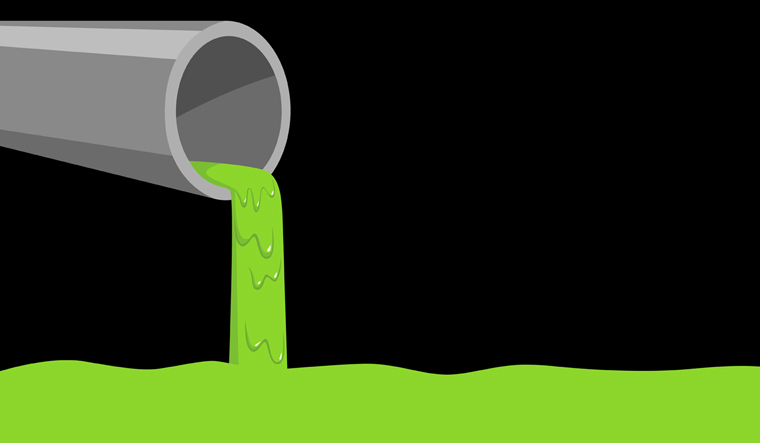Industrial Wastewater Treatment: Personalized Solutions for Facility Wastewater Obstacles
Wiki Article
Recognizing the Comprehensive Refine of Fluid Garbage Disposal: Ideal Practices and Environmental Influence Factors To Consider
The management of liquid garbage disposal is a complex concern that calls for an extensive understanding of different ideal methods and their associated environmental effects. From the kinds of fluid waste generated to the approaches utilized for collection, treatment, and final disposal, each step plays a vital duty in securing ecosystems and public wellness. As regulatory criteria progress and innovation developments, the conversation around these procedures ends up being increasingly important. What implications do these adjustments hold for future sustainability efforts, and exactly how can stakeholders ensure that they are appropriately attended to?Types of Fluid Waste
Recognizing the various kinds of fluid waste is crucial for effective administration and disposal methods. Fluid waste can be generally categorized right into several kinds, each requiring distinct handling and therapy methods.Industrial fluid waste typically includes harmful materials, consisting of heavy steels, solvents, and chemicals, produced throughout making processes. These wastes demand strict regulative compliance to secure human wellness and the setting. Residential liquid waste mainly describes wastewater created from houses, including sewer and greywater, which, although much less hazardous, can still posture substantial risks if improperly taken care of.
Agricultural fluid waste, consisting of overflow from ranches, frequently consists of plant foods and chemicals that can lead to ecological deterioration if not dealt with sufficiently. Medical fluid waste, created from healthcare centers, consists of infected fluids such as bodily fluids and chemicals, requiring specialized disposal approaches to avoid infection and environmental contamination.
Finally, oil and oil waste, commonly produced by restaurants and automobile sectors, can cause extreme blockages in sewage system systems otherwise managed appropriately. Comprehending these groups promotes targeted methods for therapy, conformity with policies, and reliable disposal techniques, eventually advertising environmental sustainability and public health and wellness safety.

Collection Approaches
Effective collection techniques are important for the proper monitoring of fluid waste, making sure that it is gathered safely and successfully prior to treatment or disposal. Various techniques are used depending upon the sort of fluid waste generated, the quantity, and the specific attributes of the waste.One typical method is making use of dedicated collection containers or sumps, which are designed to capture fluid waste at the source. These systems commonly include pumps that help with the transfer of waste to bigger storage space containers or treatment facilities. In addition, mobile collection devices equipped with vacuum modern technology are employed in circumstances where waste is generated periodically or in hard-to-reach areas.
For commercial settings, closed-loop systems can effectively decrease leaks and spills, permitting for the recovery and reuse of liquid waste. It is likewise important to train employees on correct collection protocols to alleviate risks associated with harmful materials.
Furthermore, applying regular maintenance schedules for collection devices ensures ideal efficiency and safety. The integration of sophisticated monitoring systems can enhance collection performance by providing real-time data on waste levels and possible threats. In general, efficient collection techniques are fundamental to lasting liquid waste administration methods.
Treatment Processes
Treatment processes play an important role in the administration of fluid waste, changing potentially unsafe products into recyclable resources or safe effluents - liquid waste disposal. These procedures can be generally classified into physical, chemical, and biological approaches, each customized to attend to details pollutants existing in the waste streamPhysical treatment approaches, such as sedimentation and filtering, job by getting rid of put on hold solids and particle issue. These strategies are often the first action in the therapy chain, effectively decreasing the lots on succeeding processes. Chemical treatments entail using reagents to reduce the effects of dangerous compounds, precipitate heavy steels, or oxidize organic toxins, thereby boosting the security of the effluent.
Biological therapy procedures, including turned on sludge systems and anaerobic digestion, maximize the natural abilities of microbes to break down raw material. These approaches are especially reliable for wastewater containing eco-friendly pollutants. Advanced treatment modern technologies, such as membrane filtering and advanced oxidation procedures, are significantly utilized to attain greater levels of purification.
Incorporating a combination of these therapy methods not only makes sure compliance with regulatory standards however likewise advertises environmental sustainability by recouping important resources from liquid waste.
Disposal Options
Just how can organizations ensure the safe and liable disposal of liquid waste? Reliable disposal options are vital for protecting public wellness and the setting. The key techniques consist of land disposal, incineration, and treatment adhered to by discharge into metropolitan wastewater systems.Land disposal entails the careful control of fluid waste in assigned garbage dumps, guaranteeing that it does not seep right into bordering soil or water. Incineration, on the other hand, subjects fluid waste to heats, transforming it right into ash and gases, which call for proper filtration to reduce discharges. This technique is suitable for dangerous wastes that can not be treated through typical methods.
In situations where liquid waste can be dealt with, organizations might select biological or chemical therapy procedures to neutralize unsafe parts before discharging the treated effluent into municipal systems. This course typically aligns with regulatory requirements, ensuring that the effluent fulfills security standards.
Ultimately, companies need to conduct thorough analyses of each disposal choice to identify its stability, taking into consideration factors such as waste make-up, regulative conformity, and prospective dangers to health and the setting. By choosing appropriate disposal approaches, companies can contribute to a responsible waste administration strategy.
Ecological Effect
The environmental impact of liquid waste disposal is a critical consideration for organizations seeking to lessen their eco-friendly impact. Additionally, the discharge of neglected or inadequately treated waste into surface waters can result in eutrophication, leading to oxygen exhaustion and the subsequent death of fish and other organisms.
To reduce these impacts, companies have to take on ideal practices such as applying strenuous waste therapy processes, this contact form promoting recycling and reuse, and sticking to regulative requirements. By taking a proactive strategy to fluid waste administration, entities can substantially reduce their environmental impact while supporting lasting advancement goals. Inevitably, a detailed understanding of the ecological impacts associated with liquid garbage disposal is crucial for educated decision-making and accountable stewardship of natural deposits.
Conclusion
Effective management of fluid waste is crucial for safeguarding ecological stability and public article source health and wellness. By adopting best techniques in collection, disposal, and treatment, alongside adherence to regulatory standards, the possibility for harmful contamination of ecological communities can be substantially reduced. Constant advancements in innovation and procedures add to lasting waste management efforts. Inevitably, an extensive understanding of fluid garbage disposal not just reduces ecological influences yet also promotes a dedication to responsible source administration and environmental stewardship.The management of fluid waste disposal is a complex concern that requires an extensive understanding of various finest practices and their connected ecological influences. From the types of fluid waste read the full info here generated to the methods used for collection, treatment, and final disposal, each step plays a critical duty in safeguarding ecological communities and public health.The environmental influence of fluid waste disposal is a critical consideration for companies seeking to lessen their eco-friendly footprint. Eventually, a detailed understanding of the ecological effects linked with liquid waste disposal is important for notified decision-making and responsible stewardship of natural resources.
Ultimately, a comprehensive understanding of fluid waste disposal not only minimizes environmental effects but also cultivates a commitment to liable resource administration and ecological stewardship.
Report this wiki page